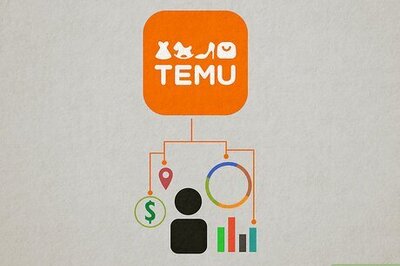
views
Karnataka’s Congress government’s fifth and final poll guarantee for the youth, the Yuva Nidhi scheme, has seen 6,062 registrations from unemployed youngsters since the opening day on December 26. However, questions are being raised by candidates on the parameters for vetting those availing of the scheme and the verification process.
In an exclusive interview, News18 spoke to the state’s Skill Development, Entrepreneurship, and Livelihood Minister Sharan Prakash Patil on how his administration plans to effectively implement the scheme, survey unemployed candidates, vet those who can avail it, plug misuse and what the government intends to do for those who were jobless before 2023, as the scheme is effective only for those who graduated in the academic year 2022-23.
Patil said that Yuva Nidhi was a poll promise made by the Congress during elections. “It was part of the Congress manifesto, and after people voted us into power, we kept our promise and implemented it. Why from this academic year? That is because we came to power now,” the minister explained.
The Congress government delayed the implementation of this scheme as it wanted to wait 180 days, a time frame it had set to see if the youth were able to place themselves in jobs, explained a senior official from the Commissionerate of Industrial Training and Employment under the Department of Skill Development, Entrepreneurship, and Livelihood.
On another question as to what would be done for those who do not fit the criteria under Yuva Nidhi as they would have graduated in the previous years, Patil said that the Congress government is committed to helping the youth, and those who do not qualify for the scheme will be provided free skill training.
“The intention of the government is not only to give out doles but also to bring candidates together on a skill portal and try to reskill them as well. Our focus is not on giving the unemployed monetary benefits but, most importantly, to provide them with skills so that they stand on their own feet. This skill development programme will be extended free of cost to all unemployed,” he said. “Global certification skill training will be provided and we have also requested IT companies to come on board as it will help them also find good talent from a readymade pool.”
According to a survey conducted by Karnataka’s higher education department, there are 5,29,123 graduates and diploma holders across the state at present. Out of these, 4,81,000 are graduates and 48,153 are diploma holders. Until December 28, candidates applied after registrations for the Yuva Nidhi scheme were formally opened by chief minister Siddaramaiah.
But the big question is when unemployed youths who are availing the benefits under the Yuva Nidhi scheme find a job or become self-employed, how would the government keep a check if they do not report it?
“We trust our youth and students,” minister Patil said to News18. “We believe that once they get a job, they will write to the department seeking withdrawal of the benefit so that another young person can avail it for their future.”
What about financial leakages; how will the government keep a check on those who may misuse the scheme?
There are many mechanisms in place to understand this, explained Patil. If a person avails of the scheme and later applies for higher education, it will be reflected in the portal of the higher education board.
“A 5 per cent random checking will be conducted to ensure only the eligible ones are availing of the scheme. We may not be able to keep a 100 per cent watch, but we are keeping a watchful eye,” Patil said.“We have also looped in the PF and ESI departments to get information if any of the applicants have found employment, either in the government or private sector. The government will get to know.”
The skill development ministry will also keep a check on Yuva Nidhi beneficiaries who may set up their own businesses. “They will have a PAN or TIN, and we will be alerted once they have a steady source of income. We believe that they will honourably give it up. If not, we have ways of recovering that money from that individual as well,” Patil said.
On the Bharatiya Janata Party asking why the Yuva Nidhi scheme cannot be extended to unemployed youth who graduated before the present academic year, Patil said that this should not be looked at as a BJP or Congress programme but a solid step to empower the youth and give them seed money to kickstart their lives.
Who can apply for the scheme?
1. Candidates should have studied in the academic year 2022-23 and have passed graduation/diploma in 2023
2. Candidates should have domicile of Karnataka during the course of graduation and diploma for a minimum of 6 years
Who does not qualify for the scheme?
1. Candidates employed in government/government-aided institutions and private sector
2. Candidates who are self-employed
3. Candidates who are continuing higher education
What is the procedure to apply for the scheme?
According to the Commissionerate of Industrial Training and Employment under the Department of Skill Development, Entrepreneurship, and Livelihood, eligible candidates need to apply after logging on to the “Seva Sindhu Portal” (http://sevasindhugs.karnataka.gov.in.). They can also apply via Karnataka-one, Bapuji Seva Kendra, and Grama One Kendras without paying any application charges.
Academic certificates of their degree/diploma can be checked through the NAD Portal link http://nad.karnataka.gov.in. They would need to log in using their degree/diploma registration number which is already uploaded from the respective universities/education institutions/boards.
The applicant would have to submit a declaration, provide his/her Aadhaar number, upload documentation, and also details to prove domicile status.
In order to prove their Karnataka domicile status of six years, the candidate should have one of the following: SSLC 8th and 9th marks cards if the candidate is a diploma holder after SSLC, PUC or SSLC marks card, CET registration number, or a ration card.
Once the application is approved, the candidate will receive an OTP via SMS and an acknowledgment will be generated confirming it.
“After all this is done, the unemployment allowance of Rs 3,000 per month to graduates and Rs 1,500 per month to diploma holders will hit their accounts after the formal launch of the scheme on January 12,” explained an official.
















Comments
0 comment